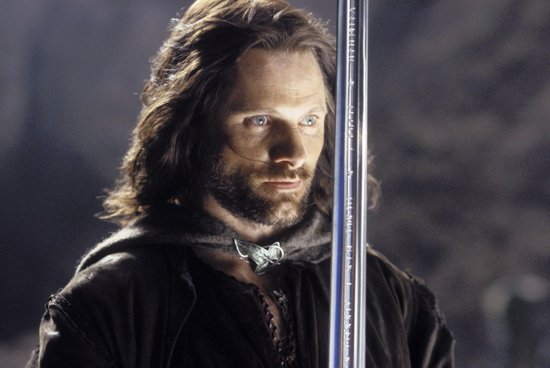Even the smallest person can change the course of the future
 In fantasy, heroes do things we can’t do in real life
In fantasy, heroes do things we can’t do in real life
Several days ago, I attended a special screening at New York City's Radio City Music Hall of the first movie in the Lord of the Rings trilogy, The Fellowship of the Ring. What made the event unique was the accompaniment by a live orchestra and choir, some 300 musicians in total, who played Howard Shore's rousing and moody score in front of the hall's massive screen. Suffice it to say, fans of J.R.R. Tolkien were pleased. Some even dressed the part as Gandalf and Frodo; others, whether in their night-at-the-opera best or street clothes, merely resembled hobbits and wizards in their stature or generous facial hair.
Unlike most movie screenings, where the audience usually remains respectfully silent (well, most of the time), here the audience felt free to let loose. When each of the major characters appeared on screen --- Elijah Wood as Frodo, Sean Astin as Samwise, Viggo Mortensen as Strider/Aragorn, Orlando Bloom as Legolas --- the audience erupted in cheers and clapping. Most fans had seen the Fellowship before, and I suspect many has seen it several or even a dozen times (like me). But that didn't matter.
We watch fantasy movies with heroic characters for plenty of reasons: because they're fun, because they're exciting, because we need to tune out and decompress for a couple of hours, or because they show us places and creatures that could never be. But one essential reason Tolkien's world, Middle-earth, is so appealing --- particularly the richly-imagined version brought to life by director Peter Jackson and composer Howard Shore --- is that its heroes do things we can't do in real life. They fight the good fight, and slay the evil orcs and goblins and uruk-hai. They take risks. They behave as we might want to: with bravery, honor, and sacrifice.
The plots of Lord of the Rings and its ilk are as old as The Iliad and Beowulf. But the feelings of being empowered are renewed each time we read or watch these epic stories of triumph and derring-do. Moreover, they inspire us. As I sat there for three and a half hours, watching a familiar quest story that has become, in the words of Gollum, "precious" to me, I realized why these tales of hobbits and magic rings and an malicious power have power over us. They remind us again, as the cliché goes, "what is worth fighting for." It comes down to that line of dialogue uttered by the elf queen Galadriel (played by the ethereal Cate Blanchett), "Even the smallest person can change the course of the future." If a three-foot hobbit can learn to wield sword, face down evil, and emerge victorious, perhaps you and I can find courage to face down our own problems and challenges, no matter how small in comparison.
Ethan Gilsdorf is the author of the new travel memoir Fantasy Freaks and Gaming Geeks: An Epic Quest for Reality Among Role Players, Online Gamers, and Other Dwellers of Imaginary Realms.